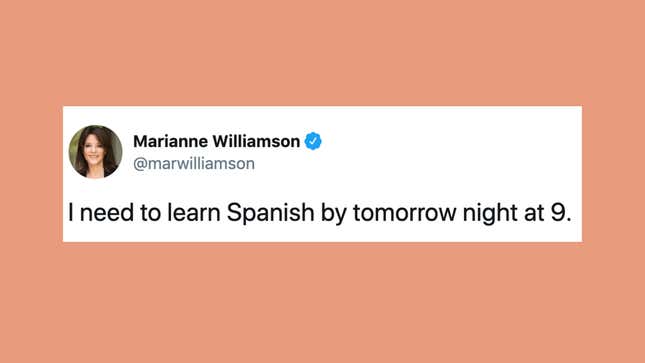

The first time I vaguely recall hearing a candidate speak Spanish was in 1999, during George W. Bush’s bid for president. During a debate between Republican candidates that December, he proclaimed, “Hay muchos hispanos que viven [aqui],” before getting into a spiel about how his party had to consider broadening their base. Just a few months after Bush won the presidency, my dad, an immigrant from Panama who wasn’t a citizen at the time, would walk home over the Queensboro Bridge from a job where he was paying thousands of dollars in taxes for benefits he will never receive, and I’d begin to understand the intricacies of a system that seldom had our best interests at heart.
During Wednesday night’s debate, nudged by the silence of the Telemundo translators, I looked up from my keyboard to see Beto O’Rourke breaking the seal, saying a few words in Spanish. Cory Booker would eagerly follow suit soon after. I felt queasy at the scent of disingenuousness.
History shows that men like this often don’t understand or prioritize the needs of Latinxs like me simply because they grew up rubbing shoulders with us. That reality is most recently and notably evident in former presidents George H. W. Bush and Barack Obama—Bush with a disastrous invasion of Panama and a reference to his three half-Mexican grandchildren as “the little brown ones”; Obama with a record-breaking number of deportations. In the past, whether or not a candidate is a Spanish-speaker has little bearing on whether familiarity (or lack thereof) actually translates to policy.
Statistically, Latinxs are the largest minority group in the United States and have only further established their mark in the polls with the number of Latinx voters nearly doubling from 2014 to 2018, according to the Pew Research Center. (Meanwhile, Latinxs in Queens, the most diverse borough in the country and the one I’m honored to call home, have shown the world what kinds of candidates a progressive, active community is capable of electing—Alexandria Ocasio-Cortez, Jessica Ramos, and Tiffany Cabán are all firsts of their kind.)
Though Trump’s presidency has disproportionately affected Latinxs, it’s also led to a heightened sense of awareness around the power we hold, and an unprecedented amount of people rallying to the polls. Yet, in attempting to appeal to the masses—about 30 million of us, to be exact—many candidates seem to be peppering their statements with words from Duolingo rather than recognizing that that this election is going to require much more than cheap tactics. At the debates, the deployment of Spanish came off as hispandering. Though Spanish is the second-most-common language spoken in the U.S. after English, the number of Latinxs who speak Spanish at home has been on the decline since 2017. According to Nielsen, 719,000 people viewed the first debate on Telemundo, NBC’s sister channel, which translated the duration into Spanish. To me, watching candidates struggle through phrases felt like waiting for a stranger on the street to stop talking so I could say, “Bob, I speak English.”
Julián Castro, former US Secretary of Housing and Urban Development and mayor of San Antonio, was the only Latino on either of this week’s debate stages, and the only Latino running this year. He spoke no Spanish throughout the first hour and 54 minutes of the first debate, as he detailed his plans to decriminalize migration and create a more inclusive reproductive health system. He then sealed his statements with an “adios” to Trump, and a simple re-introduction to Latinx viewership. The swift inclusion was both respectful and welcome by that point. Though the Texan is open about not being fluent in Spanish, his use of it felt more natural despite his imperfect accent, and came across as a simple acknowledgement rather than a misguided strategy to attract the Latinx electorate.
During Thursday night’s debate, Pete Buttigieg was the only candidate who either completely disengaged from Twitter the night before (if so, I’m jealous), or was still valiantly dumb enough to give the Spanish thing a go. “Muchas gracias de invitarnos,” or Thank you from inviting us, he said. No, thank you.